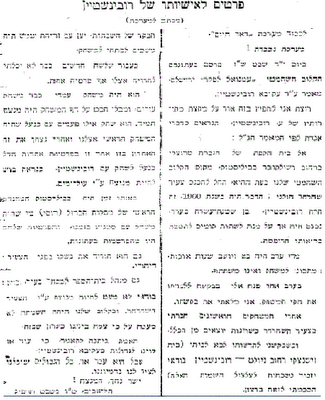| Source: Doar Ha'Yom, 27/4/31, p. 1 |
Akiba Rubinstein had, as was noted here previously, visited Palestine in April, 1931, and gave various simultaneous exhibitions. This event made quite a splash -- and, again, was on the front page of the papers, in this case Doar Ha'Yom, with his picture. On 26/4 (p. 4) and 27/4 (p. 1) the newspaper reported about a simultaneous exhibition in Jerusalem on 25-26/4 (+34 =3 -3) and Haifa on 22-23/4 (+38 =8 -5) -- the same exhibition reported about more shortly here by Davar -- with the names of the winners and those who drew.
The organizers of the Haifa simul were G. Levin, Kniazer and Marmorosh; in Jerusalem they were (again) Marmorosh, Wilson (perhaps the same Wilson who wrote the letter to Doar Ha'Yom in the previous post?) and the lawyer Schmetterling (phonetic spelling), although on 26/4 the total number of players in the Jerusalem simul is reported to be 36, and on 27/4, 40. It is added that the opponents in Jerusalem included two blind players, and a combination of young pioneers in work clothes with religious Jews in traditional clothes.
The 27/4 report notes that both took place from the evening to the early morning without a break. It adds that the Haifa simul was in effect a consultation simul, since "behind every player stood a group of friends who gave him advice", and that sometimes the sets were such that Rubinstein found it difficult to distinguish between a pawn and a piece. It adds that Rubinstein might play a live chess game in Palestine -- which had not occurred.
On 28/4 Doar Ha'Yom added a long eyewitness account (p. 2) of the Jerusalem simul by K. Silman. Some choice quotes:
Rubinstein does not look at the players. He only cares about the moves. In one moment he sees the entire battle, what to do and what to avoid. But sometimes he sees a serious situation or a deep problem. Then he lights his cigarette and stays a while longer. When he sees an unexpected move his brows rise for a minute and his eyes become slightly red. That is a time of great thinking.
... His opponents had left their work, or leisure, or studies of the Talmud or mathematics, and absorbed themselves in this halacha [lit. "religious teaching" -- A.P.], the chess game. Sometimes their hands are clenched, and sometimes, the thumb moves as it does when the man studies the Talmud, while thinking: "Ay, ay, ay... what does this mean? What does he want to show us with this move? What does it means?" The [Orthodox] Jewish Jerusalemites seem to have forgotten where they are, and think they are in their schul.
The public paid particular attention to Shlomo Hazan and Eliyahu Gomel, two students from the school for the blind, who were moving their hands over the pieces
... It is interesting: Rubinstein puts all his might into the pawns. He leaves the other pieces for later, leaving them behind his pawns. A democratic Jewish measure! ... He seems to be willing to abandon them at every opportunity, but takes care of his pawns. He is even willing to sacrifice his queen... the real power belongs to the pawns.
... Neither once nor twice he exchanged his queen for a mere knight, so as to fortify the position of another pawn. At the end of one game, the master has four pawns to his opponent's three on an otherwise empty board. He allowed his opponent to queen a pawn; but the master, at the same time, had attacked the king and mated it: one, two, three forced moves, and it is mate.
... Who lost? Who lost? A player who always plays in the "Vienna" cafe in Jerusalem, a man who always brags of his chess power... and also that man... and him -- he is completely lost...
... Mate, mate mate! The master was mated! And everybody knows the letters [in Hebrew of course -- A.P.] of "mate" [מט, "mat"] are an acronym of מזל טוב [mazal tov]: "congratulations"!This rather colorful account seems to imply that Rubinstein "gave value for the money" in terms of sacrifices and attacking play. Unfortunately, no game scores were given.





